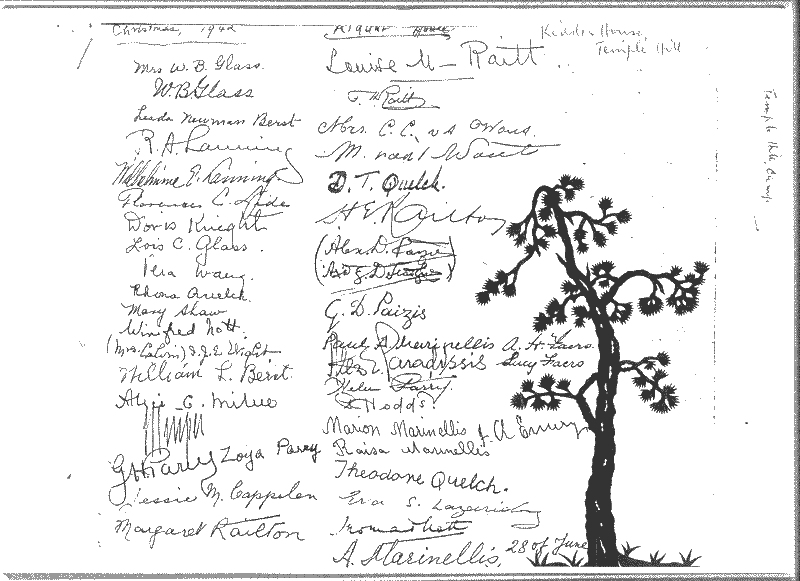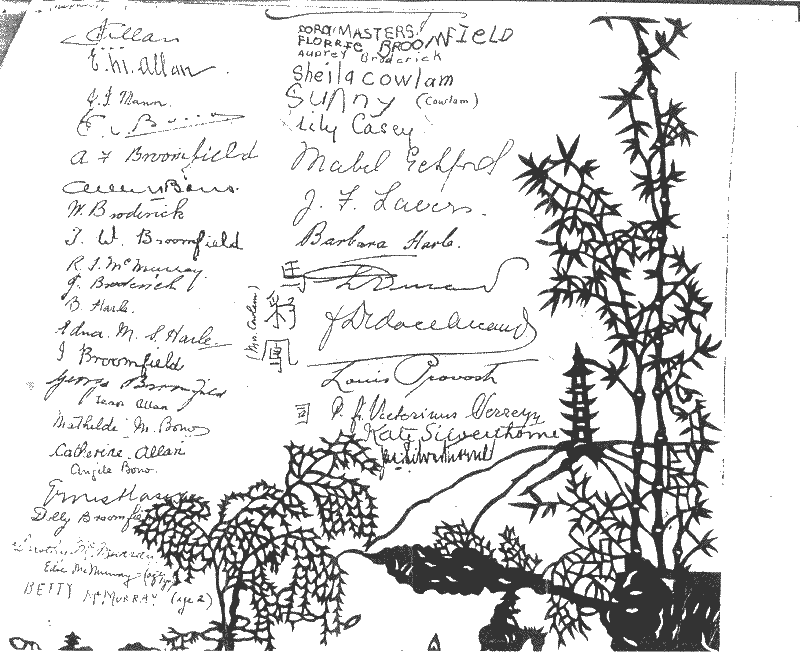Chefoo - Temple Hill
“HIGHER
GROUND”
Chapter
26.
Internment
Biography of Wiley
B. Glass, Missionary to
By: Eloise Glass
Cauthen.
In October even our limited liberties ended. All
"enemy aliens" were confined in the Chefoo Civil Assembly Camp. Only one man
escaped from it, and he was caught and returned.
The Presbyterian compound on Temple Hill was divided into three parts for
the camp. Our part was two one-family residences beside the church. Forty-seven
people were placed in one house; Jessie and I were two of the sixty-three
assigned to the other. After ten days of impossible crowding, twenty-one were
moved to another place; but forty-two of us still shared
it.
There were ten people in our bedroom. We spread what we had on the floor
and were grateful that Lois' two trunks produced bedding to share. Later we were
able to get bed boards, saw horses, and even curtains to partition off our
spaces. We appropriated many things from the attics for our use and were
especially glad to find plenty to read. Each room had a stove. We were allowed
to hire artisans to make boilers, stove pipes, and other essentials. One big
snow had already fallen, and it was a long, cold winter.
Each house group was assembled, and a military officer read the
regulations that would govern our lives. No one was to leave his assigned yard
without an accompanying guard. All men had to go with the military while they
took inventory. All funds of any kind were counted and put in a safe, which was
never to be opened except in the presence of the Japanese in charge. I was made
camp treasurer. We were to feed ourselves as long as there was any money. We
made a weekly assessment of twenty dollars per person, but some had come in
without a cent; and before long few could pay. Before the winter was over, the
Japanese had to feed us. We ran short of meat, butter, and sugar, but we never
really suffered.
We organized to share the chores of living. One of the Presbyterian
doctors was my partner on the sanitation squad to empty the toilet buckets.
There were no flush commodes or sewers. Some chopped kindling and brought in
coal. All ashes had to be sifted to find any cinders that might burn again. The
younger men pumped water, two at a time. It was a strenuous job, and the pump
was constantly getting out of fix. We had to do our own laundry, of course.
Folks managed to keep fairly decent. After the ground began to thaw, one old man
got his exercise by working in flower beds and planting flowers everywhere they
would grow. A particular inconvenience was lack of a dining room. After we
picked up our plates in cafeteria style, we took our food to our bedrooms and
ate on the small bit of floor space marked out as ours.
Mail was so rare that any letter became everybody's letter. Very few
trickled in from the outside. A letter written by Baker Cauthen from Free China
in November did reach us in February.
Somehow we learned that the eight thousand "enemy nationals" in
We really were not badly off. The Japanese officer in charge of our camp
was a gentleman in every way. He granted every request he dared think the
military would allow. He had been a captain. Most of the guards were disabled
soldiers, and only a few were friendly. Most were brusque and strictly
businesslike, so I was touched when one of the officers said of me to others, as
we were leaving, "This is my friend from Hwanghsien."
The former Japanese consul, who had been most considerate and efficient,
was removed by the military, but his successor seemed to try to help the
internees as much as he could. The Swiss consul was our representative with the
Japanese and looked after our interests. He obtained some money for milk for the
camp when the milkman had said he would deliver no more until bills were
paid.
Our Baptist group received some love gifts from Chinese Christians who,
like David's men who brought him water from the well of
The Japanese insisted that anyone in the camp with money would help to
support the camp. In polite English, but with a bayonet at his throat, they told
a Greek import-export man, "Yes, you put in money, please. Thank
you."
This wealthy man, said to be the richest in the port, was allowed to go
home once a month under guard to visit his invalid daughter and his aged mother.
At those times we sent out dirty linens to the laundry by him. Through a German
neighbor who often visited his home, we were able when we left internment to
send our comfort money (five dollars in
It was a deep joy to know that Tsang Tien-pao, my former student, then my
colleague, and now principal of the seminary, was keeping it going. He led in
planting the campus with vegetable gardens from which the students could support
themselves.
A great variety of people were interned in the Chefoo camp. Some of the
non-religious had a superstitious faith in our daily
At first the various preachers were called upon in turn to lead Sunday
services; but by the first of January, our two houses beside the church decided
they would choose a pastor. Everybody was given a vote, and I was unanimously
elected. We had good music, and I greatly enjoyed preaching. One of the favorite
songs was "Higher Ground," unfamiliar to many of the group until that time.
Because I taught it to my congregation, I was somehow identified with
it.
We had fun times, too. Occasionally we planned a social evening. Every
Thursday some qualified member of the group delivered a lecture. Daily classes
were offered in a variety of subjects.
We were aware that negotiations were continuing in
Chapter
27.
Repatriation and
Release
When repatriation plans were at last made
definite, I requested permission for Lois and me to visit the cemetery.
Everybody in camp helped to gather flowers with which we filled the two
rickshaws we had hired. The guard who accompanied us rode a bicycle. We heard
Chinese people along the way speculating that there had been a death in the
camp. As no conversation was allowed en route, we could not tell them they were
wrong.
The gardener's daughter and another girl in the cemetery had been at our
school in Hwanghsien. When they saw us they called out, "Our teacher, our
teacher!" and came running to know why we were there.
I spoke to them, explaining our errand, until the guard came toward us threateningly. The girls
away,
but watched while Lois and I went throughout the cemetery laying flowers on
the graves of all Baptist missionaries and children of missionaries. We longed
to talk, and the girls longed to hear; but we had to return to camp without
another word to them. Enough had been said, however, for the Chinese to know
that we were to leave
It was a relief not to be rebuked for having spoken to the girls. Lois
had received one reprimand, and that was all she wanted. She had written postal
cards in Chinese and received letters in internment; consequently, she was
reported by a spy. I had been called on the carpet twice but I was never abused,
struck, or manhandled.
Three days after the cemetery trip, fifty-five of us were shipped to
We were held in Weihsien sixteen days, the remainder of the Chefoo camp
joining us a week after our arrival. The well-organized Weihsien camp held about
two thousand internees housed in the dormitories and classrooms of a
Presbyterian school compound. Japanese officers occupied the residences. We
enjoyed meeting old friends and attending concerts by a gifted pianist who was
interned there.
Our real troubles began when we left Weihsien for
The ship we boarded was an old French liner renamed the Teia Maru. The
typhoon season having begun, it rained constantly. We could see that the
lifeboats were so cracked that the rain ran right through them, and there were
enough only for about one-third of the sixteen hundred on board. The masts were
cracked, and the ropes were rotten. We sailed from
Food on the ship was the worst of our experience. Rice was steamed all
night, but only three-fourths of the worms were well cooked. We received fat
pork only half-cooked. Once in a while we had eggs, but they were not good.
Coffee was hard to get because persons who had Japanese money raided the kitchen
and left no coffee to serve the tables. During this time Jessie developed sprue, the sore mouth and inflamed digestive tract that
follows dietary deficiency. It continues for life.
At each port where repatriates were to be picked up, our vessel sat out
in the sea. Our ship stayed several days in
End of
page.




